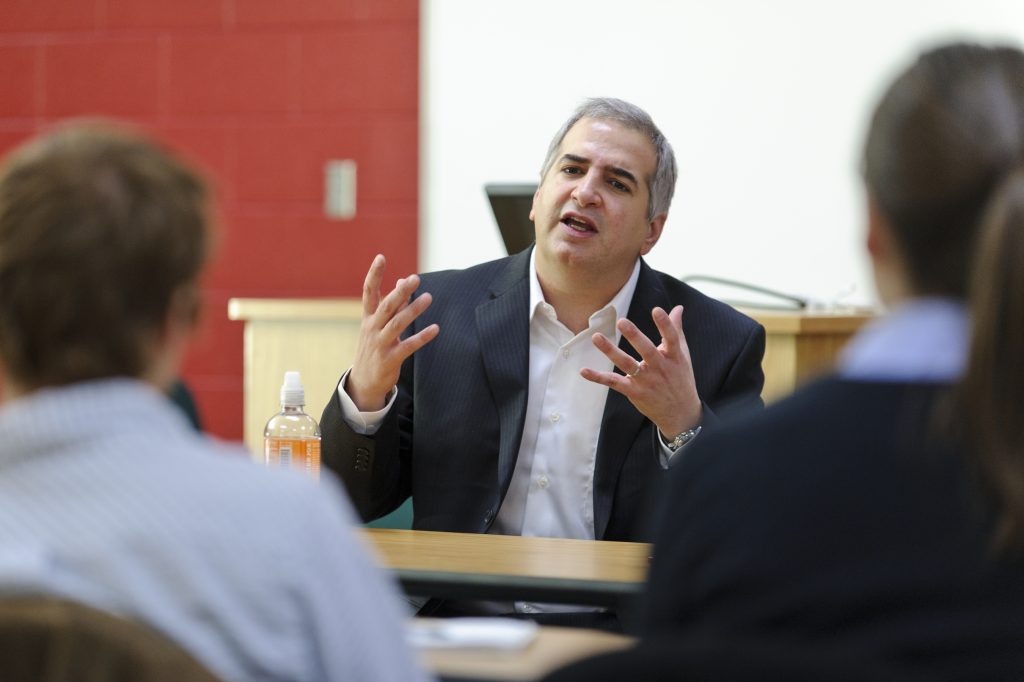WHO WAS ANTHONY SHADID?
A graduate of the UW-Madison, Anthony Shadid died in 2012 while crossing the Syrian border on a reporting assignment for the New York Times. He won two Pulitzer Prizes for his courageous and insightful foreign correspondence. Shadid sat on the ethics center’s advisory board and strongly supported its efforts to promote public interest journalism and to stimulate discussion about journalism ethics.

Shadid won the Pulitzer Prize for international Reporting in 2004 for his coverâge of the U.S. invasion of Iraq and the occupation that followed. He won the Pulitzer Prize again in 2010 for his coverâge of Iraq as the United States began its withdrawal. In 2007, he was a finalist for the Pulitzer Prize for his coverage of Lebanon and the war there with Israel. He has also received the Arthur Ross Award for Distinguished Reporting & Analysis onForeign Affairs (2009), the American Society of Newspaper Editors’ award for deadline writing (2004), the Overseas Press Club’s Hal Boyle Award for best newspâper or wire service reporting from abroad (2004) and the George Polk Award for foreign reporting (2003).
In 1997, Shadid was awarded a citation by the Overseas Press Club for his work on “Islam’s Challenge.” The four-part series, published by the AP in December 1996, formed the basis of his book, Legacy of the Prophet: Despots, Democrats and the New Politics of Islam, published in December 2000. His second book, Night Draws Near: Iraq’s People in the Shadow of America’s War, was published in September 2005. Night Draws Near won the prestigious Los Angeles Times Book Prize for Current Issues and the Ron Ridenhour Book Prize. It was also a nominee for the National Book Critics Circle Award for General Nonfiction and was a New York Times Notable Book of the Year. His last book, House of Stone: A Memoir of Home, Family and a lost Middle East, was published in Spring 2012.
Shadid was passionate about staying connected with the J-School and The Daily Cardinal, the student newspaper that gave him his start in journalism. He returned regularly to give guest lectures and generously mentored students even while he was reporting abroad. Asked once what he missed most from his time in Madison, Shadid smiled and answered, “The Cardinal, of course.”
In December 2010, Shadid gave the inaugural CJE ethics lecture. His powerful speech, The Truths We Tell: Reporting on Faith, War and the Fate of Iraq,conveys Shadid’s commitment to the highest ideals of journalism.
THE ANTHONY SHADID AWARD FOR JOURNALISM ETHICS
The Shadid Award recognizes ethical decisions in reporting stories in any medium, including print, broadcast and digital, by journalists working for established news organizations or publishing individually. The award is different from other journalism prizes in that it seeks to recognize the difficult, behind-the-scenes decisions reporters make in pursuing high-impact stories and in fulfilling their ethical obligations to sources, to people caught up in news events, and to the public at large.
THE ANTHONY SHADID MEMORIAL FUND
The Anthony Shadid Memorial Fund benefits students interested in international reporting. The fund is named in honor of Anthony Shadid, a UW-Madison graduate who died in 2012 while reporting on Syria for the New York Times. He won two Pulitzer Prizes for his courageous and insightful foreign correspondence. Shadid sat on the Center for Journalism Ethics advisory board and strongly supported our efforts to promote public interest journalism and to stimulate discussion about journalism ethics.
